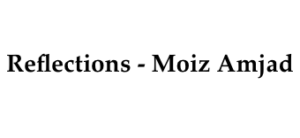“If we are all a creation of God – a moral Creator – who has made goodness inherent in all of us, then why do we find goodness to be so rare? Don’t you think that if goodness was inherent in all of us, it should have been more commonly observed?” I asked.
“First of all, I don’t think that goodness is as rare as we sometimes tend to think.” He immediately replied. Then, after a moment’s silence, he continued, “I think, we tend to see more of whatever you call the opposite of ‘goodness,’ because we become conditioned to focusing on it and expecting it from others. Thus, on the one hand, we expect it from others and, on the other, we notice it more.”
After a few more moments of silence, he said, “As for your question, what I call ‘inherent goodness’ does not mean that humans are supernaturally inclined and attracted toward doing ‘good’. It neither implies that people have more potential to do good, as compared to their potential for doing ‘bad’, nor does it imply that taking to the path of goodness is easier for people, as compared to avoiding it,” he said. Then taking a slow, deliberate sip of his strong black coffee, continued, “what it means to me is that we feel more elated and at peace inside when we do what we consider to be good, even if treading this path can occasionally be very difficult and can sometimes entail huge costs. I also think that we are in a state of inner conflict, disturbance, and, sometimes, even guilt when we indulge in something that we know to be wrong, even if doing so gives us immediate pleasure and gratification of desires.”
“Even if that is the case, why do we not see more of goodness around us? Do you think people don’t value this state of inner peace and serenity?” I asked.
He looked at me with a strange kind of pain in his eyes and said, “can you think of a time when you knew what was the right thing to do, but you still didn’t do it for some reason?”
“I don’t know what you mean,” I said, hoping I would be able to avoid answering his question.
“For instance, can you think of a time when a small action on your part could have saved someone from a big…,” I could not wait for him to finish and interjected, “yes, once while traveling on a bus, I could have saved an old man from a big hassle and a lot of embarrassment, by paying a very small and insignificant amount for his ticket. I could not bring myself to take that step and sat there frozen, while the ticket checker forced him out of the bus. Whenever that thought comes to my mind, I feel extremely sorry for it and wish I could, somehow, do something about it now.”
“I really can understand that,” he said, and asked, “Had you been able to help that old man on that day, how would you have felt today, recalling that incident?”
I thought for a while and then said, “I am sure, the memory of the incident would have been a source of extraordinary joy and great pride for me.”
“Yes, I am sure that it would indeed have been one.” He said, and then after a few moments of silence, added, “what do you think held you back from taking that step?”
“I can’t say exactly what hindered my taking that small action,” I said and then added as an afterthought, “maybe, I just did not want to stand out from among so many people sitting in the bus; maybe I didn’t want people to think of me as a pompous and a pretentious person.”
“I can understand that. Really! I can relate to that too. There have been times that I have felt exactly that way,” he said. Then after a pause and a couple of sips of his coffee, added, “many times, we avoid doing the right thing, because doing the right thing can entail an immediate cost or a loss of benefit – even if the cost is just to stand out of the crowd. This potential cost or loss of benefit may or may not be huge, but it is generally immediate. And in our desire to avoid that cost, we miss out on the opportunity to do the right thing and, thus, miss out on experiencing the spiritual and moral elation that comes with doing what we consider to be ‘right’. Then, if we keep treading this path, it becomes a habit; And once it becomes a habit, we stop deliberating on our actions and their consequences – for ourselves as well as for others – and simply keep doing what will help us avoid the immediate costs and loss of benefits.”
I just sat there, trying to digest what he had just said. After a long silence, he said, “just think about it.”
January 4, 2020
(Dubai, UAE)
